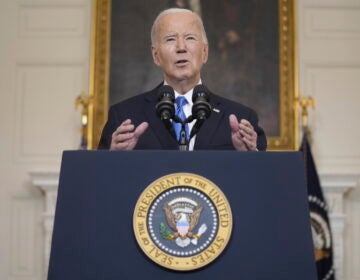Democrats modify attack ad in Pennsylvania’s U.S. Senate race
Listen
A national Democratic group has modified a TV ad attacking Pennsylvania Republican U.S. Sen. Pat Toomey after his campaign challenged the claims in the spot.
The ad and its contents sparked a nasty exchange when Toomey faced off with Democratic challenger Katie McGinty at the candidates’ debate at Temple University Monday night.
McGinty has hammered Toomey because he was part owner of a bank that used a little-known technique, “confession of judgment,” to collect on commercial loans.
When a confession of judgment provision is inserted in commercial loan contracts, creditors can get a judgment against a delinquent borrower without a hearing or even notice.
The Democratic Senatorial Campaign Committee put the charge in a hard-hitting ad (above).
“It’s a lending practice so outrageous most states banned it,” an announcer says in the ad. “But at the bank owned by Pat Toomey, it was business as usual, forcing 21 small-business owners out of their homes.”
Lawyers for the Toomey campaign complained that in the 21 foreclosure actions, there’s no evidence anyone was forced out of his or her home. The two cases cited by the Democratic Senatorial Campaign Committee involved a warehouse and a vacant residence.
When the issue surfaced at Monday’s debate and McGinty accused Toomey of predatory practices, Toomey pushed back hard.
“Those ads were taken down today because they’re so blatantly dishonest. They’re off the air, across the state,” Toomey said.
That’s a bit of an exaggeration. After one TV station raised questions following Toomey’s complaints, the DSCC modified the ad a bit, removing the reference to 21 homes, but keeping the gist of the message, according to DSCC spokeswoman Laura Passalacqua.
A Toomey press release Tuesday said even the modified ad had been yanked by station WBRE in Wilkes-Barre and other stations owned by the Nexstar Broadcasting Group.
Bob Bee, station manager for WBRE, told me no such thing had happened at his station. He said the ad had been modified by the DSCC, and that’s all.
The DSCC’s Passalacqua said the ad is still on the air.
“The truth about Sen. Toomey’s bank and how he used a controversial maneuver to foreclose on Pennsylvanians continues to be broadcast on television across the state,” she said.
Bigger question – is it fair?
There’s a debate about the fairness of the confession of judgment practice.
What happens is that a commercial borrower, anxious to get funding, agrees to let the lender get a quick judgment against him in the case of default, without even notifying the borrower.
It’s true it’s not legal in most states, where creditors have other methods to collect, such as attaching the borrower’s assets.
But it’s a common practice in commercial loans here, and it appears in loan contracts for the Small Business Association for borrowers in states where it’s permitted.
And, as Toomey noted in the debate, you could find it in contracts of the Pennsylvania Department of Environmental Protection when McGinty headed it.
A leader in the Center for Responsible Lending told Politico earlier this month that confession of judgment is an “end around” the legal foreclosure process that “moves very, very quickly.”
Barry Bressler, an attorney with Schnader Harrison Segal & Lewis who’s practiced in creditors’ rights and real estate litigation for decades, told me that use of confession of judgment has been restricted by the courts over the years.
It’s banned in consumer transactions, he said, but is still used in commercial loans and leases. After a federal case a few years ago, he said, rules were amended to give borrowers faced with a confession judgment 30 days to request a hearing and dispute the action.
I asked Bressler if it’s fair to call the practice predatory.
“You hear that when a borrower or lessee’s lawyer is trying to get it out,” he said. “I would not use those words. I would say it is a bit Draconian, but lawyers in the commonwealth know the practice, know it’s there, and they negotiate.”
WHYY is your source for fact-based, in-depth journalism and information. As a nonprofit organization, we rely on financial support from readers like you. Please give today.





